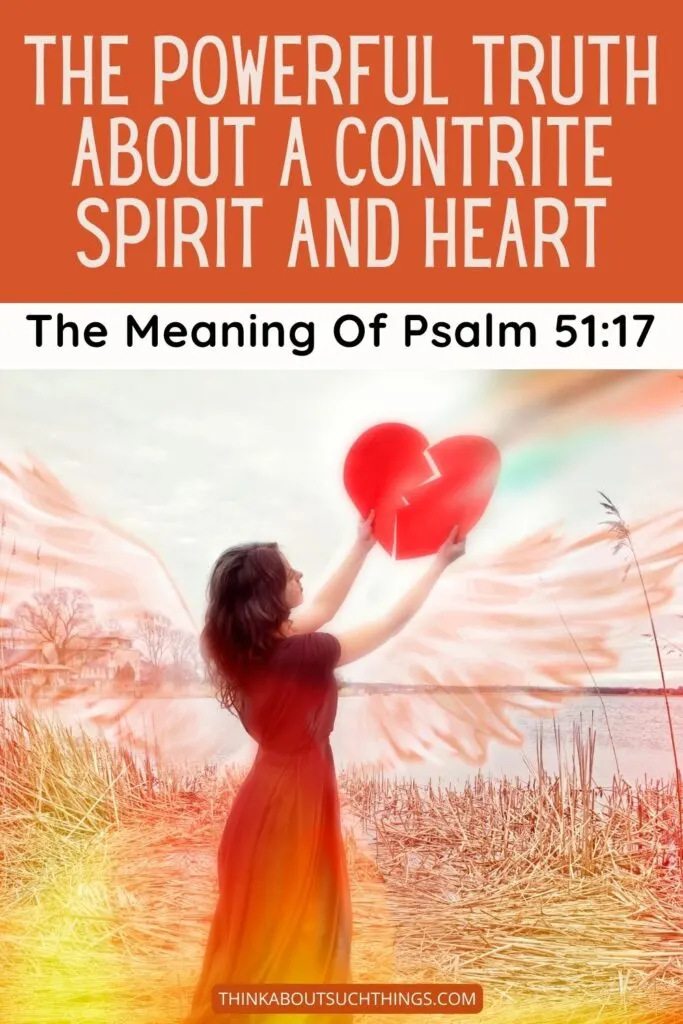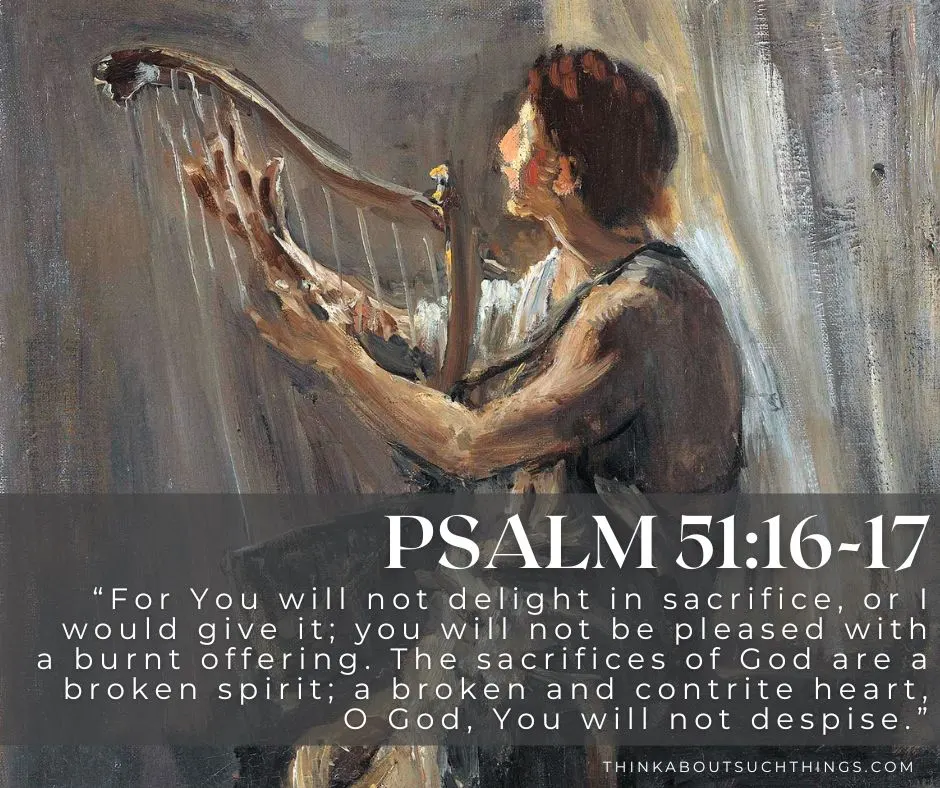In this article, we will be learning about a broken spirit and contrite heart by looking at Psalm 51:17, meaning, and more! So, grab your Bible, and let’s learn…
Most believers know about the powerful and devastating background of Psalm 51.
It’s an outcry from David after the prophet Nathan confronted the king about his sins of adultery and murder.
Psalm 51 might be the most sorrowful and brokenhearted Psalm that David ever wrote.
But in verse 17, David mentions that he has a broken spirit and a contrite heart. It’s interesting that he mentions it, but…
What exactly do those words mean, and what can believers learn from a man after God’s own heart who repented with a contrite heart and spirit?

What Does It Mean To Have A Broken Spirit?
Psalm 51:16-17 says,
“For You will not delight in sacrifice, or I would give it; you will not be pleased with a burnt offering. The sacrifices of God are a broken spirit; a broken and contrite heart, O God, You will not despise.”
To understand what a broken spirit is, let’s start by looking at the Hebrew meaning of the words.
The word “broken” is the Hebrew word “Shabar” (Strong’s number H7665).
שָׁבַר shâbar, shaw-bar’; a primitive root; to burst (literally or figuratively):—break (down, off, in pieces, up), broken (-hearted), bring to the birth, crush, destroy, hurt, quench, × quite, tear, view (by mistake for H7663).
Broken is an accurate translation, but it is slightly lacking – it could also mean burst, broken into pieces (shattered), crushed, or destroyed.
The word “spirit” in Hebrew is “ruach” (Strong’s number H7307).
רוּחַ rûwach, roo’-akh; from H7306; wind; by resemblance breath, i.e. a sensible (or even violent) exhalation; figuratively, life, anger, unsubstantiality; by extension, a region of the sky; by resemblance spirit, but only of a rational being (including its expression and functions):—air, anger, blast, breath, × cool, courage, mind, × quarter, × side, spirit(-ual), tempest, × vain, (whirl-) wind(-y).
It means wind in the context of breath and is usually interpreted as referring to a person’s life, mind, and courage.
The spirit is seen as the non-physical essence of a cognitive person, very much the same way we still see it today.
When David said that he had a broken spirit, he essentially said that everything that made him who he was, his very living essence, was crushed, shattered, and destroyed.
Think about David’s situation for a moment.

Here we have a man who was living in a very close relationship with the Lord for most (if not all) of his life. Through his faith in God, he fought off the bear, lion, and even the giant Goliath when he was young and still a shepherd.
He endured struggles and trials that most of us can’t even begin to imagine, and his faith in God was the only thing that carried him through it.
David was also a man who surrounded himself with men of excellence, and one of those men was the head of David’s army, who was so committed that he refused to spend the night with his wife while his men were on the battlefield.
Such men naturally gravitated towards David as their leader and their king.
In one action, David betrayed both God and one of his most dedicated and noble supporters.
He not only ruined his relationship with God, putting everything that he had built his life on, at risk, but then made it even worse by committing what could be seen as the worst sin: murder.
It’s safe to say that, when David was confronted with his sin, he was more than just a little distraught. The full force of what he had done hit him, and he was completely and entirely broken.
Everything that he believed, the entire foundation of his life, was shaken and destroyed. There was nothing left of the man called David, the man after God’s own heart.
That’s why he pleaded with God so fervently to restore the joy of his salvation and to create a clean heart within him. In verse 10, David asks God to renew a right spirit within him, and that can only happen if your spirit is broken first.
Read more of the story here in 2 Samuel 12.
What This Means For Modern Believers
When we sin and feel guilty, it’s the Holy Spirit Who convinces us of that sin.
Like David, the Holy Spirit can bring us to the point where we feel indescribable anguish over the things we’ve done, and in many cases, that’s what we deserve.
We don’t always realize the damage we are doing to others through our sin.
When this happens, we can respond in a few different ways.
Some people just ignore the conviction. It’s easy to overlook the fact, justify it in our minds, and move on. However, we can see that this is not conducive to having a good relationship with God and will eventually lead to death in some form (James 1:15).
The second way we can deal with sin is to try and “barter” with God.
We can make promises – “God if you will forgive me and free me from this sin, I promise to do x or y.”
But that’s similar in approach to making a sacrifice, and here David directly says that God does not want a sacrifice or burnt offering, which is even more true today since we already have the sacrifice of Jesus.
The correct way to handle a conviction of sin is to go to God with a truly broken spirit. But, that’s not always easy; every fiber in our beings resists this. So, how do we do it?
Depending on the sin, it can often help by looking at the harm you’re doing. For example, try to imagine turning the tables and seeing how it would affect you if someone did that to you. This can be a good starting point.
It’s also interesting to note that the word “ruach” often refers to the Holy Spirit.
When we look at Psalm 51:11, for example, we see David pleading with God not to take His Holy Spirit away from him, and the words for the Holy Spirit are “qodesh ruach” (H6944 and H7307).
We should never underestimate the work of the Holy Spirit in bringing us to repentance and humbling us before the Lord, but also breathing new life into us and reviving us. It is part of His purpose in the lives of believers.
The other aspect that can help you have a broken spirit is a contrite heart.
What Does It Mean To Have A Contrite Heart?
The word “contrite” is the Hebrew word “dakah” (Strong’s number H1794). It means to collapse, break, or crouch.
דָּכָה dâkâh, daw-kaw’; a primitive root (compare H1790, H1792); to collapse (phys. or mentally):—break (sore), contrite, crouch.
The word translated as “heart” is the Hebrew word “leb” (Strong’s number H3820). It doesn’t usually refer to the physical organ but to your feelings, will, and intellect.
לֵב lêb, labe; a form of H3824; the heart; also used (figuratively) very widely for the feelings, the will and even the intellect; likewise for the centre of anything:—care for, comfortably, consent, × considered, courag(-eous), friend(-ly), ((broken-), (hard-), (merry-), (stiff-), (stout-), double) heart(-ed), × heed, × I, kindly, midst, mind(-ed), × regard(-ed), × themselves, × unawares, understanding, × well, willingly, wisdom.
One of the most crucial points here is that “Shabar” (broken) refers to a state of being.
David’s spirit was broken. However, the word “dakah” is a more active statement – it’s about doing something and performing an action to make something some way.
Like David, who decided to face the full consequences of his actions and beg God’s forgiveness, we should also take action to force our feelings, will, and intellect to collapse, break, or crouch.
This requires humility and a willingness to experience the consequences of your actions. We must stare our actions in the face and see the spirit and attitude behind them.
Force our emotions and will to acknowledge it. It’s not a feeling but a deliberate choice.

Even if you don’t understand what was so wrong with your actions, the fact that the Holy Spirit reveals it to you (in your heart or through scripture) should be enough reason to humble yourself and submit your will to Him. This will lead to a broken spirit.
Some believers spend time in front of the Lord, asking Him to give them genuine regret to bring about repentance, then they wait for the feeling to appear.
God doesn’t often work like this (though it happens occasionally). Your flesh (and will) don’t want to admit that you did something wrong, so it will resist the conviction at all costs.
You have to make a choice and take action to prove your remorse and true repentance.
>> Check out 25 Comforting Bible Verses for a Broken Heart
Having A Broken Spirit And Contrite Heart In Modern Times

David was one of the few people in Old Testament times who recognized that God’s grace did not depend on the sacrifice of an animal.
It was always about Jesus and the price that He would pay for man’s sins. True, David did not understand the totality of it all, but he realized that God made provision for his forgiveness and that no animal could pay that price.
So, he took the only thing he could to God – his brokenness.
He went to God completely humble and broken, ready to face the consequences of his actions but realizing that he could never pay the price.
And he knew that God would justify him through grace if he showed genuine remorse and repentance, after which God would delight in his sacrifices again as seen in verse 19.
Then will You delight in the sacrifices of righteousness,
In burnt offering and whole burnt offering;
Then young bulls will be offered on Your altar. – Psalm 51:19
Today, after the sacrifice of Jesus to pay for the sin of all humanity, we can easily ride the “grace train,” indulging in all kinds of sins, believing that we are safe because Jesus already paid the price.
But this scripture shows that God still requires something from us – true repentance and remorse, an active choice and action to take responsibility for our actions and to change the course of our lives.
Yes, Jesus’ sacrifice was more than sufficient for all of humanity’s sins; we can add nothing to that.
But sin still hinders our relationship with God, our spiritual growth, and our testimony to build His Kingdom.
And what is salvation if we don’t have any of this? How can we expect to spend eternity with God if we don’t know Him and we take every opportunity to ruin our relationship with Him?
Modern believers must rediscover the power of a broken spirit and a contrite heart. We must eliminate the mentality that “God owes us because Jesus paid for it” and develop a strong sense of respect for our Heavenly Father and the price that He paid out of love for us, so that we might be saved.
There are few things that can bless our relationship with the Father as much as being humble with a broken spirit and a contrite heart before Him.
To recap on what does Psalm 51:17 mean…
A broken spirit means having genuine remorse over our actions, and a contrite heart refers to being humble and forcing our will to come in line with the intention of God.
The two walk hand in hand, and true repentance requires both aspects.
But the result is incredible. The humility that comes from this level of repentance can do wonders for our relationship with God and our spiritual growth, and it brings us that much closer to reflecting the essence of Christ-likeness in our lives.

Melissa is a passionate minister, speaker and an ongoing learner of the Bible. She has been involved in church and vocational ministry for over 18 years. And is the founder of Think About Such Things. She has the heart to equip the saints by helping them get into the Word of God and fall more in love with Jesus. She also enjoys family, cooking, and reading.
She has spoken in churches in California, Oregon, Texas, and Mexico and has been featured in Guidepost Magazine and All Recipes Magazine. Read More…
